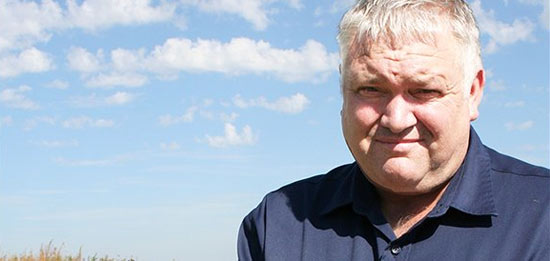By day, Miller is a third-generation Barton County, Kansas, farmer-stockman with a 370-head commercial cow operation. He and his wife, Connie, and their three daughters also farm more than 7,500 acres of wheat, alfalfa, milo, corn and soybeans.
Keith Miller Border CaptionFor many men, that would be enough to keep occupied. But Miller has diverse interests. He has been active locally, serving on the county board, as president of U.S.D. 355 School Board, on numerous boards and commissions, including Midwest Energy Inc., which provides power to the western half of Kansas. He's also served on Kansas' Natural and Environmental Resources and State Resolutions committees, testifying before numerous legislative committees. And for more than 20 years, he has been actively involved with Farm Bureau, which was his entrée to USMEF.
"One day, sitting on the tractor, I realized that 70 percent of everything I grow is going into meat exports," said Miller. "I thought that if I get involved (in USMEF) and I can make a difference, it will improve my farm and others like mine."
Miller did get involved through Kansas Farm Bureau, which joined USMEF. He attended USMEF's fall 2003 meeting and became interested, not only in the international market, but in spreading the message that investing Checkoff dollars in the international market is critical.
"If we want to be profitable, exports are where the future is," said Miller. "But most people don't know where their Checkoff dollars are going. Once they learn that, it makes them more interested. The people I've spoken to and explained what USMEF does begin pushing it (investment in international marketing) themselves. That's where the opportunities are."
Miller looks at the global growth projections, which show more than 2 billion more people to feed by the year 2050 - nearly the equivalent of two more Chinas - and sees opportunity for U.S. red meat exports.
"We're looking at declining domestic red meat consumption," he said. "For farmers like me to remain profitable, we need to be ready to meet the demand of foreign consumers and provide them the product they're looking for, not just what we want to supply them. They are the customer and, as the old saying goes, the customer is always right."
"The customer," as Miller has observed from his travels to overseas markets including Japan, South Korea and China, is being actively wooed by a number of U.S. red meat competitors, including Australia, Brazil, Denmark and many others. In Hong Kong, for example, 45 different countries are exporting beef to that high-value market.
"Our competition is not standing still," Miller said. "Markets like Hong Kong, Japan and Korea are where the premiums are being paid for U.S. beef and pork, and every beef- and pork-producing country in the world wants those premiums."
That brings Miller to one of his key messages as he starts his year as chairman of USMEF: funding for international programs.
"I cannot emphasize enough the importance of the USDA Market Access Program (MAP) funds, as well as the Checkoff funds we receive from the beef, pork, corn and soybean industries," he said. "Together, they are an effective tool for USMEF to conduct marketing and educational programs and gather the intelligence that our industry needs to preserve and grow our market share in these key markets.

"As we expand those programs, we need to expand our funds proportionately," he said.
Miller also noted that by utilizing its relationships with international importers, retailers and food service operators, USMEF has been able to obtain significant investments to support U.S. programs overseas. In the past year alone, USMEF has gained $24.3 million in these "third-party" commitments to magnify the buying power of the U.S. investment.
"USMEF has an outstanding staff, both domestically and overseas, and they have done an excellent job of maximizing both the MAP dollars and Checkoff money. For every $1 in Checkoff money that USMEF spent overseas this year, it's been able to match it with $2.77 in funding from USDA, its membership and international business partners," said Miller. "That's an effective use of our Checkoff dollars."
http://campaign.r20.constantcontact.com/render?llr=c5vsuydab&v=001dXbC6UqaAI5zp2o121LF6_dZqDgJ5C9yd597hWL6E4TwpcrG_lEyxS5j3x35lY1mUYXgh0WNB0teLwdN0ZJ1y8ZFmBnH1FtDXW1FE_AIiVyJYj3wUouD9Q%3D%3D



